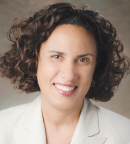Screening for colorectal cancer should start at age 50 and continue until age 75, according to the updated recommendation from the U.S. Preventive Services Task Force (USPSTF).1 “Exactly what screening gets done is something that doctors and patients should decide together,” USPSTF Chair Kirsten Bibbins-Domingo, PhD, MD, MAS, told The ASCO Post. Factoring into the decision to choose among the multiple tests available should be the benefits, potential harms, and availability of the different tests; patient preferences; and how likely an individual patient is to get the test done.
“This is a complex recommendation statement that I would urge others to take the time to read and understand. The overall import of this recommendation statement is very simple—We have great evidence of a large benefit to colorectal cancer screening, and unfortunately one-third of the population does not get screened and so is not taking advantage of this benefit,” Dr. Bibbins-Domingo stated. “The top-line message to communicate is that one should get screened.” Dr. Bibbins-Domingo also holds the Lee Goldman, MD, Endowed Chair in Medicine and is Professor of Medicine and of Epidemiology and Biostatistics at the University of California, San Francisco. (A simplified version of the updated recommendations, “Understanding Task Force Recommendations,” written for patients, is available at www.uspreventiveservicestaskforce.org.)
Embrace Shared Decision-Making
“This embrace of shared decision-making for choosing a screening test is a pivotal step forward for the task force,” according to the editorial accompanying the recommendation statement published in The Journal of the American Medical Association.2 The editorial also noted: “To be an equal partner in this conversation, patients must learn about the strategies and their consequences.”

The top-line message to communicate is that one should get screened. Exactly what screening gets done is something that doctors and patients should decide together.— Kirsten Bibbins-Domingo, PhD, MD, MAS
Tweet this quote
“As a clinician myself, it is one of the things we aspire to and should be doing,” Dr. Bibbins-Domingo commented. “We are fortunate that in the area of cancer screening generally, we are making great strides in decision tools and strategies for helping doctors and patients communicate effectively about this,” she continued.
“For a patient to engage in shared decision-making, they have to have the information and understand the information. There is evidence that patients do want to engage. It is up to us as clinicians to figure out how best to communicate complex evidence to help patients make the best decision for them.”
What tests are available to specific patients often depends on what is covered by their health insurance. “Health plans, insurance plans, health systems, may choose to emphasize one test or another test, depending on the availability of the types of tests and the types of personnel required to perform different types of tests,” Dr. Bibbins-Domingo said. And although the USPSTF does not consider costs in its screening recommendations, “We do see our recommendation statements as hopefully being helpful to doctors and to patients, but also to insurers and to health plans. The task force does not make recommendations about coverage. We do think it as an important point to be able to show efficacy and understand the evidence base and for that information to be available to others who then make decisions about insurance coverage.” ■
Disclosure: Dr. Bibbins-Domingo reported no potential conflicts of interest.
References
1. U.S. Preventive Services Task Force, Bibbins-Domingo K, Grossman DC, et al: Screening for colorectal cancer: U.S. Preventive Services Task Force recommendation statement. JAMA 315:2564-2575, 2016.
2. Ransohoff DF, Sox HC: Clinical practice guidelines for colorectal cancer screening: New recommendations and new challenges. JAMA 315:2529-2531, 2016.

